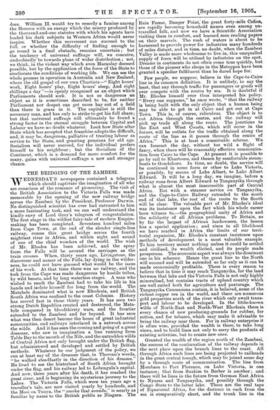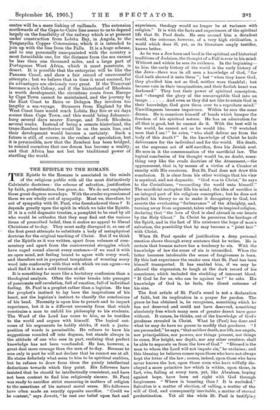W EDNESDAY'S newspapers contained a telegram which should captivate the imagination
of all who are conscious of the romance of pioneering. The visit of the British Association to the Victoria Falls was made memorable by the opening of the new railway bridge across the Zambesi by the President, Professor Darwin. No distinguished scientist has ever had entrusted to him a more fascinating task, and we can well understand the kindly envy of Lord Grey's telegram of congratulation. The first stage in the wildest fairy-tale of modern Empire- making has been completed. Seventeen hundred miles from Cape Town, at the end of the slender single-line railway, comes this great bridge across the fourth mightiest river in Africa, and within sight and sound of one of the chief wonders of the world. The wish of Mr. Rhodes has been achieved, and the spray from the Falls will be around the carriages as the train crosses. When, thirty years ago, Livingstone, the discoverer and namer of the Falls, lay dying in the wilder- ness, he could not have guessed what would be the issue of his work. At that time there was no railway, and the trek from the Cape was made dangerous by hostile tribes, by wild beasts, and by long, waterless stages. A man who wished to reach the Zambesi had to take his life in his hands and isolate himself for long from the world. The Matabele dominated what is now Rhodesia, and British South Africa was confined to the coast Colonies. History has moved fast in these thirty years. It has seen two strong Dutch Republics created and destroyed, the Mata- bele conquered in bloodthirsty wars, and the frontier extended to the Zambesi and far beyond. It has seen What was then desert become the home of great industrial communities, and railWays interlaced in a network across the wilds. And it has seen the coming and going of a great dreamer, who saw in imagination a line running from Table Bay to the mouth of the Nile, and the untrodden wilds of Central Africa not only brought under the British flag, but administered and developed and settled by British methods. Whatever be our judgment of the policy, we can at least say of the dreamer that, in Thoreau's words, "he walked steadfastly in the direction of his dreams." He lived• to see the hinterland of South Africa, brought under the flag, and his railway led to Lobengula's capital. And now, three years after his death, it has reached the great river, and is beginning its mysterious journey to the. Lakes. The, Victoria Falls, which were ten years ago a traveller's tale, are now visited yearly by hundreds, and the Mosi oa Tunya, the " smoke that sounds," is nearly as familiar by name to the British public as Niagara. The Rain Forest, Danger Point,' the great forty-mile Carlon, are rapidly becoming household names even among un- travelled folk, and now we have 'a Scientific Association visiting them in comfort, and learned,men reading papers on their marvels. The rush of waters is about to be harnessed to provide power for industries many hundreds of miles distant, and in time, no doubt, when the Zambesi Valley is made more wholesome to live in, this unequalled supply of force will be utilised by industries on the spot. Dreams in continents do not often come true quickly, but those of the pioneer who sleeps in the Matoppos have been granted a speedier fulfilment than he dared hope for.
Few people, we suppose, believe in the Cape-to-Cairo line in its common definition. It is unlikely, to say the least, that any through traffic for passengers or goods will ever compete with the routes by sea. It is doubtful if Mr. Rhodes himself ever thus interpreted his policy. " Every one supposes," he once wrote, " that the railway is being built with the only object- that a human being may be able to get in at Cairo and get out at Cape Town. This is, of course, ridiculous. The object is to cut Africa through the centre, and the railway will pick up trade all along the route. The junctions to the East and West Coasts, which will occur in the future, will be outlets for the traffic obtained along the route of the line as it passes through the centre of Africa." This is at least a conceivable scheme. We can forecast the day, without too wild a flight of fancy, when there will be reasonably effective communica- tion from Cairo to the Cape. At present it is possible to go by rail to Khartoum, and thence by comfortable steam- boats to Gondokoro. In time, no doubt, the service will be continued in some form or other to Lake Victoria, or possibly, by means of Lake Albert, to Lake Albert Edward. It will be a long day, we imagine, before a railway runs from Albert Edward to Tanganyika through what is almost the most inaccessible part of Central Africa. But with a steamer service on Tanganyika, and the Cape-to-Cairo Railway extended to the south end of that lake, the rest of the route to the South will be clear. The valuable part of Mr. Rhodes's ideal was its insistence upon the fact which his whole career bore witness to,—the geographical unity of Africa and the solidarity of all African problems. To Britain, as by far the largest of African landowners, the lesson has a special application ; and since in all likelihood we have reached in Africa the' limits of our terri- torial expansion, Mr. Rhodes's constant insistence upon methods of development is a most valuable example. To him territory meant nothing unless it could be settled and civilised, its wealth elicited, and its people made prosperous. The economic aspect was always the dominant one in his schemes. Hence the great line to the North will succeed and will be extended so far only as it can be made economically profitable. There is every reason to believe that in time it may reach Tanganyika, for the land between that lake and the Victoria Falls is not only highly mineralised, but contains tracts of upland country which are well suited both for agriculture and pasturage. The Tanganyika Concessions contain, it is believed, some of the richest copper ore in the world, and there are numerous gold properties north of the river which only await trans- port and labour to be developed. In the little-known wilds of North-East and North-West Rhodesia there is every chance of new producing-grounds for rubber, for cotton, and for tobacco, which may make it advisable to bring the railway near them. For in railway enterprise it is often wise, provided the wealth is there, to take long views, and to build lines not only to carry the products of existing activities, but to create new ones.
Granted the wealth of the region north of the Zambesi, the success of the continuation of the railway depends in the next place upon the branch lines to the coast. All through Africa such lines are being projected to railheads in the great central trough, which may be joined some day by a through route of communication. The line from Mombasa to Port Florence, on Lake Victoria, is one instance ; that from Suakim to Berber is another ; and there will be lines in the future from German East. Africa to Nyassa and Tanganyika, and possibly through. the. Congo State to the.latter lake. These are the real taps of Equatorial Africa, for the distance in each from the sea is comparatively short, and the trunk line in the centre will be a mere linking of railheads. The extension northwards of the Cape-to-Cairo line seems to us to depend largely on the feasibility of the railway which is at present under construction from Lobita Bay, in Angola, to the Tanganyika Copper Concessions, which it is intended to join up with the line from the Falls. It is a huge scheme, and to one personally unacquainted with the country a most formidable one, for the distance from the sea cannot be less than one thousand miles, and a large part of Portuguese West Africa, which it must penetrate, is desert. It is possible that the enterprise will be like the Panama Canal, and show a fair record of unsuccessful attempts ; but we believe that in time it must succeed, for its advantages are obviously very great. If the Transvaal becomes .a rich Colony, and if the hinterland of Rhodesia is worth development, the circuitous route from Europe by Cape Town cannot be maintained, and the journey by the East Coast to Beira or Delagoa Bay involves too lengthy a sea-voyage. Steamers from England by the West Coast lines would reach Lobita Bay five or six days sooner than Cape Town, and this would bring Johannes- burg several days nearer Europe, and North Rhodesia several weeks. Instead of being a remote hinterland, the trans-Zambesi territories would lie on the main line, and their development would become a certainty. Such a future is still, of course, in the realms of speculation, but it is permissible, now that the Zambesi has been bridged, to remind ourselves that one dream has become a reality, and that Africa has not lost her traditional power of startling the world.











































 Previous page
Previous page